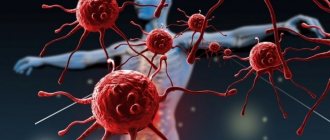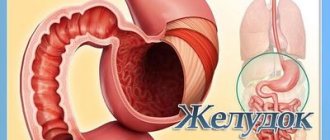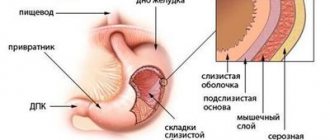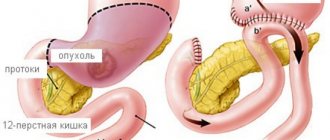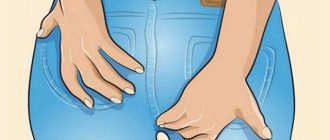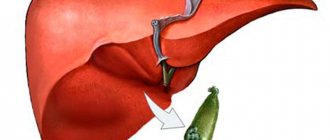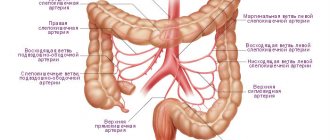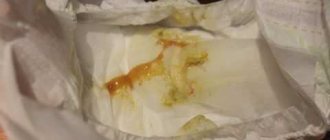The frequency of bowel movements varies widely among people. Three times a day to three times a week is considered normal frequency. If more than three bowel movements occur in a day, the condition is called diarrhea. Less than three bowel movements per week is called constipation.
These classifications of abnormal bowel movements take into account only the frequency of bowel movements. However, other factors such as the volume of stool with each bowel movement, the shape of the stool and its size are equally important in identifying abnormal bowel behavior. The characteristics of stool according to these criteria also vary, and although some degree of abnormality may be considered normal, there are limits beyond which stool is considered abnormal.
Causes of thin stool in an adult
Let's look at what diseases cause thin stool. It occurs with hemorrhoids, the presence of parasites in the body, spasm of the rectal sphincter, the development of neoplasms, colitis, irritable bowel syndrome. When people don't drink enough fluids or eat too much fast food, feces that are too thin can also appear.
The appearance of ribbon stool is often observed in pregnant women. Why this happens can be explained very simply. Due to the fact that during pregnancy the fetus grows rapidly, the uterus expands greatly and puts pressure on the rectum. Thereby reducing its clearance. Therefore, feces come out of the rectum in the form of a ribbon.
In men, sometimes stool looks like a pencil with prostatitis. This is an inflammation of the prostate gland, which also results in a narrowing of the lumen of the small intestine.
Thin stool for hemorrhoids
Hemorrhoids are inflammation of the hemorrhoidal veins in the lower part of the rectum. As a result of this inflammation, the blood flow in the veins is disrupted, they stretch and nodules form. Depending on their location, there are three forms of hemorrhoids: internal, external and combined.
Causes:
- sedentary lifestyle,
- frequent constipation and diarrhea,
- pregnancy,
- alcohol abuse,
- unhealthy diet
- heredity.
In the early stages, hemorrhoids do not cause any sensations, but only as the disease develops do symptoms increase.
Manifestations of hemorrhoids: the pain that occurs during the act of defecation is very pronounced, cutting and burning in nature. Due to the formed nodules, which narrow the lumen of the small intestine, excrement cannot exit the body normally. They are compressed and have difficulty passing through the intestinal tract, causing constipation and ribbon-like stool. It may be mixed with mucus, sometimes with scarlet blood located in stripes. In this case, the blood does not mix with the excrement, but remains on its surface.
With constipation, stool is often not soft, it can be either long, sausage-shaped, or intermittent. After emptying the rectum, the patient experiences very itching in the anal area. Anal fissures may occur due to prolonged constipation. If the form of hemorrhoids is external, then lumps are visible within the anus. In the internal form, blood is observed on linen, feces or toilet paper. Also, when the disease is long-term, during defecation the internal node may fall out of the rectum.
Hemorrhoids require mandatory treatment, as they can serve as the beginning of the formation of malignant processes in the intestines.
Digital examination of the rectum by a proctologist and sigmoidoscopy will help diagnose the disease. These methods make it possible to identify the presence of nodules and examine the intestinal mucosa.
Rectal neoplasms
Constipation and ribbon-like stool can also occur when polyps or other neoplasms grow on the intestinal mucosa.
The most dangerous condition is the development of malignant processes. With rectal cancer, ribbon-like feces are observed; the larger the tumor grows, the thinner the feces become. Dark blood appears, which mixes with feces, prolonged constipation. Mucus secretion occurs before bowel movements begin. You can also note the general symptoms that occur with any malignant formation - weight loss, fatigue, lethargy, anemia, decreased immunity.
Polyps are benign growths on the intestinal mucosa. They also cause the appearance of ribbon-like feces, since they also narrow the intestinal lumen. Polyps themselves are not dangerous, but they can become malignant, which is something to be wary of. This is the process of transforming a benign tumor into a malignant one.
If an adult is suspected of developing an oncological process in the rectum, the following research methods are used:
- finger examination,
- anoscopy – insertion of an anoscope into the anus to examine the surface of the anal canal,
- sigmoidoscopy,
- Ultrasound,
- stool occult blood test,
- general blood analysis,
- blood chemistry.
Treatment consists of stopping the growth of the tumor using radiotherapy and chemotherapy. Doctors often resort to surgery.
Damage to the body by parasites
Thin stool in a child may be due to infection of the body with parasites. For example, with giardiasis, an inflammatory process of the intestines occurs as a result of the presence of lamblia in it, because of this the feces become ribbon-like. In children, inflammation of the rectal mucosa may also occur due to infectious processes.
Irritable bowel syndrome
Irritable bowel syndrome is a disorder in the functioning of the human intestine without compromising its integrity.
Symptoms that occur with IBS are divided into the following groups:
- intestinal,
- associated with other digestive organs,
- unrelated to the digestive tract.
Intestinal – characterized by pain in the lower abdomen on the left side.
The nature of the pain is different: cutting, burning, dagger-like, constant, aching. Abdominal bloating, diarrhea, constipation, ribbon-shaped or pea-shaped feces with mucus, without admixture of blood and pus, are observed. Symptoms from other organs of the gastrointestinal tract - nausea, vomiting, sour belching, a feeling of bitterness in the mouth. Other complaints are sleep disturbances, anxiety, pre-depression.
The causes of irritable bowel syndrome vary. Among them are:
- heredity,
- experienced stressful situations,
- passive lifestyle,
- unhealthy diet
- previous infectious intestinal diseases,
- poisoning,
Diagnosis of IBS:
- general blood analysis,
- blood chemistry,
- general urine analysis,
- coprogram
- Ultrasound of the abdominal organs,
- colonoscopy,
- FGDS.
When treating the syndrome, a diet and medications are used that are aimed at combating the symptoms. They resort to psychotherapy sessions when depression is the cause of the development of IBS.
Is thin stool a pathology?
Typically, in adults, stool is thick and sausage-like; this can normally be large pieces of stool, or it can come out in small portions. The most important thing is that the stool is regular, plasticine-like in consistency and does not cause discomfort to the person during the act of defecation.
If the poop is thin, resembles a pencil, or comes out in stripes, then this is no longer quite normal for an adult. If a thin line of feces comes out of the rectum, then this is a sign of the development of a disease or a change in the functional activity of the intestine.
Ribbon-shaped feces can appear due to a nutritional disorder, when a person’s diet is unbalanced and lacks plant foods. A sedentary lifestyle in addition to this diet can lead to pencil-shaped stool leaving the intestines.
Photo
Band-shaped stool may result from drinking excessive amounts of alcoholic beverages. The large intestine stops functioning normally under the influence of alcohol, and disturbances in the shape and frequency of stool appear. First, hard, then loose stools, difficulty in passing feces, changes in the diameter, color and consistency of feces - all these are consequences of alcohol abuse and should be abandoned, otherwise ribbon-shaped feces will not be the only symptom of a bad habit.
If the stool comes out in thin sausages for these reasons, then there is no need to worry too much. After all, on the one hand, this is not so bad, you can adjust your diet and everything will return to normal. But if thread-like or snake-like feces continue to bother a person even after eliminating harmless causes, then this is a reason to undergo diagnostics and determine the factors causing the appearance of irregularly shaped feces.
Preventing the appearance of ribbon-shaped stool
To ensure that you do not have thin stool, you first need to monitor your diet.
The diet must be balanced; liquid food should not be neglected. You need to eat often, in small portions. You should limit the consumption of harmful foods, do not eat dry food, and drink enough fluids. Also an important preventive measure is avoiding stressful situations. If possible, you should be less nervous. Stress and anxiety are the causes of various pathological processes.
You should play sports and lead an active lifestyle. Quitting bad habits such as smoking and drinking alcohol will also reduce the risk of disease.
Diet and lifestyle
The consistency, frequency, and volume of bowel movements a person produces depends largely on dietary and lifestyle factors. For example, not drinking enough water can dry out stool and make it difficult to pass. Water makes up about 60% of stool weight under normal conditions. The volume of bowel movements is often significantly reduced due to inadequate water intake, even in cases where the person is not actually dehydrated.
Dehydration and decreased stool volume are often the result of excessive alcohol and caffeine consumption. These substances cause dehydration by increasing the frequency of urination. In addition to inadequate water intake, low fiber intake also causes constipation and reduces stool volume. A sedentary lifestyle and lack of regular exercise often contribute to an increase in constipation.
Causes caused by the nervous system
The act of defecation depends on the muscular contractions of the walls of the colon, rectum and anal canal. These muscle contractions are stimulated and coordinated by the nervous system. Therefore, any problem with the nerves can cause problems with bowel movements. Examples of nervous system disorders that can lead to constipation and small stool volumes include spinal cord injury, multiple sclerosis, diabetic neuropathy, stroke, and Parkinson's disease.
Muscular causes
The act of defecation depends on coordinated muscle contractions of the walls of the rectum and anal canal. Therefore, any disturbance in the intestinal muscles leads to problems with intestinal motility and also contributes to constipation and low stool volume.
Examples of such muscle disorders are muscular dystrophy, dyssynergia, anism, and weak pelvic muscles. Therefore, the pelvic floor muscles cannot relax. Therefore, bowel movement is prevented. With dyssynergia, contractions of the intestinal muscles are not properly coordinated. This causes irregular bowel movements.
Obstruction in the intestines
Low stool volume may also result from obstruction of stool movement through the colon, rectum, or anal canal. If a small amount of stool comes out, there is most likely an obstruction. Constipation caused by an obstruction in the intestines is also known as obstructive constipation. Conditions that lead to constipation include narrowing of the intestinal lumen (stricture), colorectal cancer, colon polyps, and enlarged prostate gland.
Not all causes of intestinal obstruction are pathological. Some physiological conditions also limit the movement of stool through the colon and rectum. Pregnancy is an example of such a condition. In this case, the colon and rectum are compressed by the expansion of the uterus. Hormonal changes that occur during pregnancy can also contribute to constipation.
Functional disorders
In some cases, there are no obvious pathological changes, which may be associated with constipation and small stool volumes. In other words, the cause cannot be identified. These cases are called functional disorders. An example is functional constipation, caused by a type of irritable bowel syndrome (IBS).
Psychogenic causes
Bowel function is also controlled by psychogenic factors. Emotions such as anxiety, fear, and depression can also cause constipation and low stool volume.
What to do if the shape of bowel movements changes?
Do not panic when ribbon-like stool appears. After all, the cause of this may not necessarily be cancer or other dangerous diseases. Sometimes it's just a result of poor diet or stress. But in order to protect yourself, if such changes appear in the stool, you still need to consult a specialist. If the cause of the change in the shape of stool is a disease, then the sooner it is diagnosed, the easier it will be to treat.
(
2 ratings, average: 5.00 out of 5)
Types of constipation
Constipation can be atonic and spastic.
Constipation can be divided into two large groups: atonic and spastic. They differ in the mechanism of constipation, as well as symptoms.
Atonic constipation occurs due to weakened peristalsis, when feces move through the intestines more slowly than usual.
The feces will be voluminous and dense. Pain with such constipation rarely occurs; more often there is a feeling of fullness in the abdomen. Atonic constipation often leads to cracks and bleeding, since defecation is difficult and painful due to the volume of stool.
Treatment of constipation with drugs
Duphalac is a drug for the treatment of constipation.
Chronic constipation is not treated with strong laxatives and enemas. Such remedies do not help eliminate the cause, but only eliminate the symptom - constipation itself.
Suppositories, enemas, and bowel irritant laxatives may be used in rare cases when going to the toilet is simply not possible, or as preparation for medical procedures.
Treatment of constipation is carried out with drugs that have a mild laxative effect, normalize intestinal function, increase the volume of feces and promote regular bowel movements.


